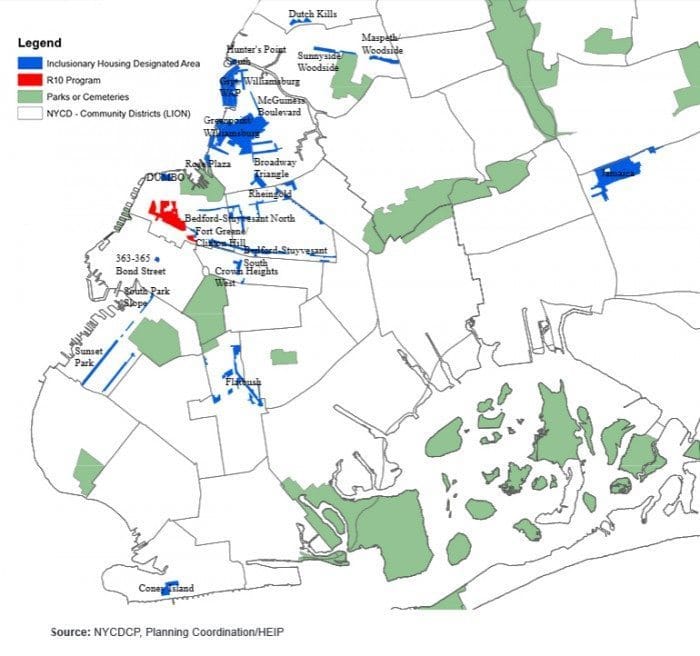City Council Stalls Mayor’s Rezoning Plan, Demands More Low-Income Housing


It’s a stalemate.
Mayor Bill de Blasio’s controversial rezoning plan — meant to address the city’s affordable housing crisis — may have been approved last Wednesday, February 3 by the City Planning Commission, but the City Council is less supportive. They have issued what amounts to an ultimatum: add more low-income housing units or we won’t approve this plan.
However, the de Blasio administration has insisted that this would not work — and countered with a threat of their own:
“We are pushing as far as we can, legally and practically,” said Department of Housing Preservation and Development Commissioner Vicki Been, alluding to the concern that developers will challenge the mandate in court if it cuts too deeply into their bottom line.
“If we push too far, we get zero housing,” she added.
The dispute developed at Tuesday’s City Council hearing on the Mandatory Inclusionary Housing (MIH) proposal — a proposal that has rankled communities throughout the city, including here in Fort Greene and Clinton Hill. Residents fear the changes will cause a construction boom that could rub out the character of their neighborhoods.
Last year, Brooklyn Community Board 2’s Land Use Committee voted unanimously to support the MIH plan, with members agreeing with the idea of increasing the percentage of housing units required in a development from 20 percent to 25 or 30 percent — and to make that housing permanent.
However, the committee voted not to support for the city’s proposed Zoning for Quality and Affordability (ZQA) rezoning project. ZQA would increase height limits by up to five feet in areas where ground floors of buildings that are not landmarked/a historic district and that are made taller to fit retail businesses. It would also eliminate parking requirements for new buildings for low-income residents and seniors — an issue that some worry will cause even greater crowding on streets.
The City Council is expected to vote on the proposals in March, according to New York YIMBY.
The Council will vote on both policies next month (in March) to wrap up the six-month-long public approval process. Most community boards voted down both proposals, as did the Borough Boards. The City Planning Commission has already greenlighted the two zoning initiatives, and the City Council vote will be the final step before they become law.
ZQA and MIH and are part of de Blasio’s mayor’s 10-year plan to create and preserve 200,000 affordable housing units.
The City Planning Commission was supposed to consider the votes of community boards — many of whom rejected the proposals — as well as public testimony to make changes to both plans. However, the commission only offered minor tweaks.
The amended ZQA now requires nursing homes to have a special permit in areas with single family homes. It also lowers the height increases in certain Manhattan neighborhoods with narrow streets. The only change to the MIH is that developers are excused from affordable housing requirements if they can prove it creates a hardship,” DNAinfo reports.
The commission is composed of six mayoral appointees, one from the public advocate, and five appointed by each of the borough presidents. The appointees from Queens, Staten Island and the Bronx voted no, according to DNAinfo.
Brooklyn’s delegate Joseph Douek voted yes but was reportedly disappointed the board did not include changes from the borough board and hoped those recommendations will be added by the City Council.
A spokesman for City Councilman Donovan Richards, who chairs the Subcommittee on Zoning and Franchises, told City & State that the council will only hold two meeting, next Tuesday and Wednesday, on the zoning proposals. Richards’ spokesperson assured the news site that the committee will go on long enough for everyone to testify.
Reporting contributed by Heather Chin.




